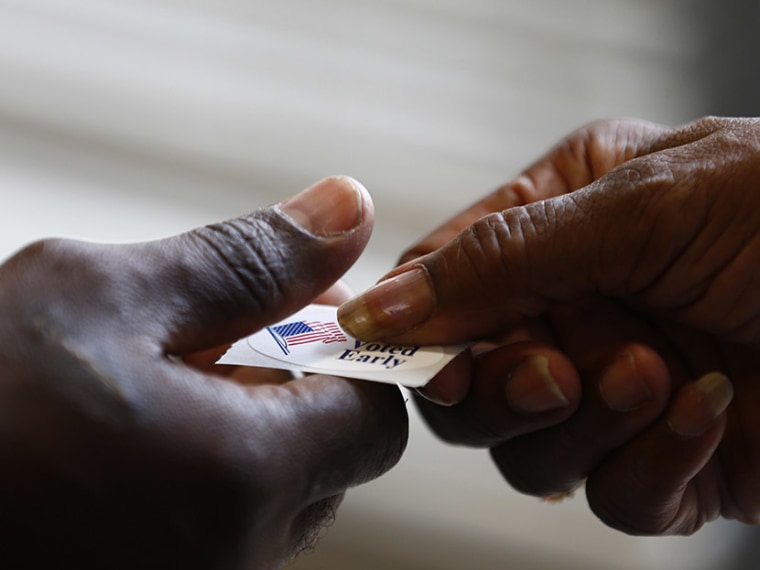President Obama waded further into the fight over voting rights with two key meetings this week.
He met Wednesday with House Democrats and will meet later with Senate Democrats over a number of key issues including voting rights. And on Wednesday, the president met with civil rights leaders and local elected officials to work out a way forward after the decision in Shelby County v. Holder that struck down a key provision of the Voting Rights Act.
These meetings come on the heels of last Thursday's announcement by Attorney General Eric Holder that he will take the voting fight to Texas. Texas' attorney general responded Wednesday with harsh words in an op-ed.
Host Melissa Harris-Perry and her Saturday panel discussed the next steps in the fight--particularly in Republican-controlled states--for the right to vote, exploring whether the model to determine discrimination in voting needs to be based on disparate impact versus that of intent.
In his Texas announcement, Holder focused on intent. "This request to 'bail in' the state--and require it to obtain 'pre-approval' from either the Department or a federal court before implementing future voting changes--is available under the Voting Rights Act when intentional voting discrimination is found."
While there are claims that Texas intentionally discriminated against voters, is "intent" the best way forward? According to Dale Ho, Director of the ACLU's Voting Rights Project, it may not be. "Focusing on intent really focuses on the wrong question," Ho said. "Focusing on intent I think focuses more on the culpability of the offender and evinces more of a concern for the offender's state of mind than what's actually happened to the victim."
So why would Holder start with Texas versus another state that had claims of voting discrimination lobbed against it?
"We had federal courts finding that two huge laws in Texas--the redistricting changes and the voter ID laws--were discriminatory last year. So there's already a record of discrimination shown," said Nation magazine contributing Ari Berman.
Texas will probably not be the last state that the DOJ looks into for laws that will disenfranchise voters. In the case of North Carolina and its omnibus voter suppression laws, the disproportionate impact to communities of color may far outweigh the intent to disenfranchise voters.
"North Carolina: their voter suppression law is going to disproportionately affect African-Americans," said Ho.
Do supporters of voter ID laws prefer the criteria of intent over impact because it is harder to prove? Ari Berman says the answer is yes, and that one only has to look to Chief Justice John Roberts' voting record to see why.
"John Roberts, when he was a young lawyer in the Reagan justice department, fought very hard to preserve the fact that section 2 had to be intent based. Congress in 1982 overruled the Supreme Court, overruled Roberts, and said section 2 just needs to be impact based. You only have to prove discriminatory impact, not intent. That preserved section 2 as one of the pillars of the voting rights act which survives today," said Berman.
But with Congress heading to their summer break, how necessary is it that both President Obama and Attorney General Eric Holder are weighing in on this issue now? Rebecca Sinderbrand, Deputy White House Editor for Politico. said, "What you're seeing here is the ultimate workaround. The same way you saw with climate change. You're seeing the workaround begin."
See Saturday's discussion below.
